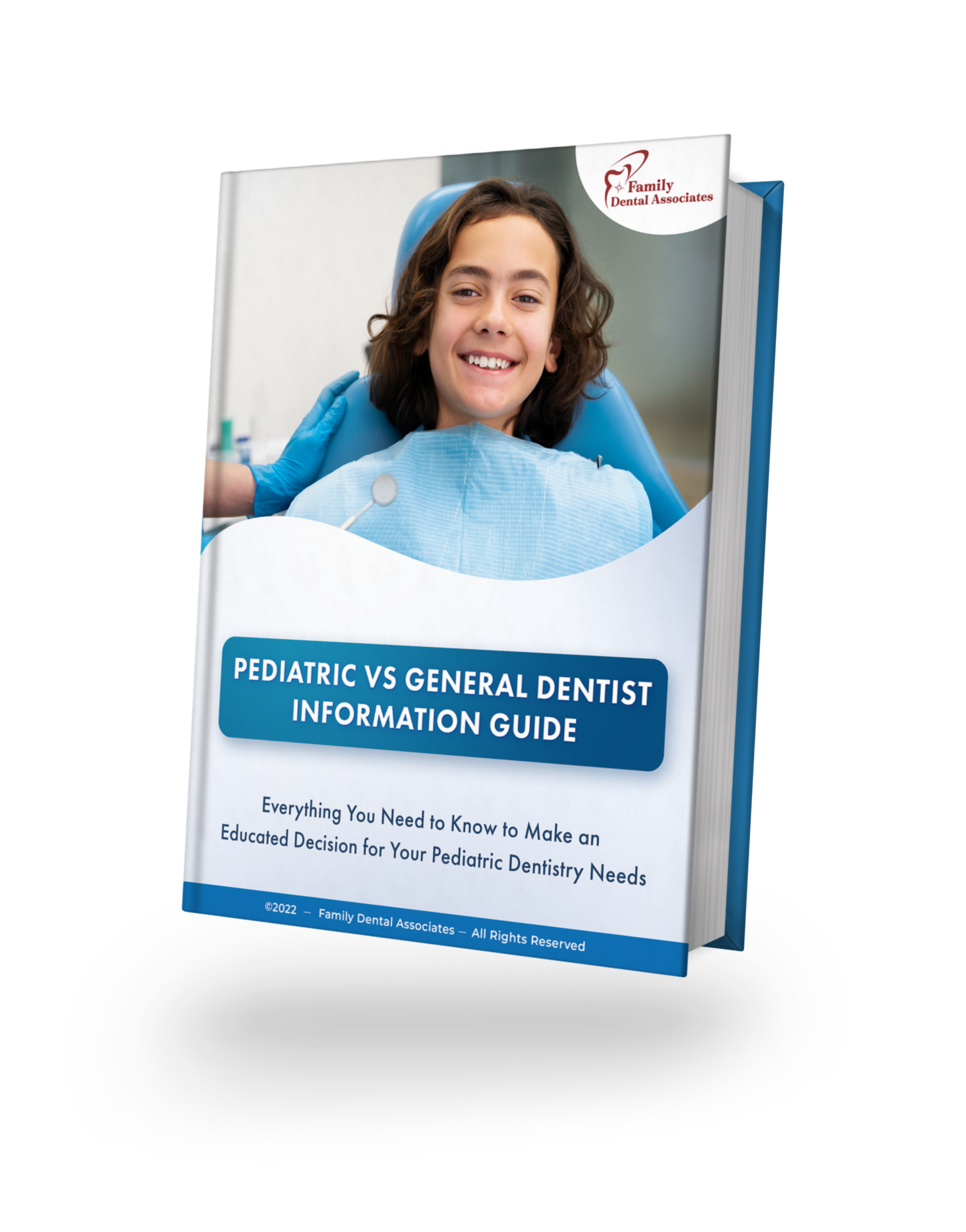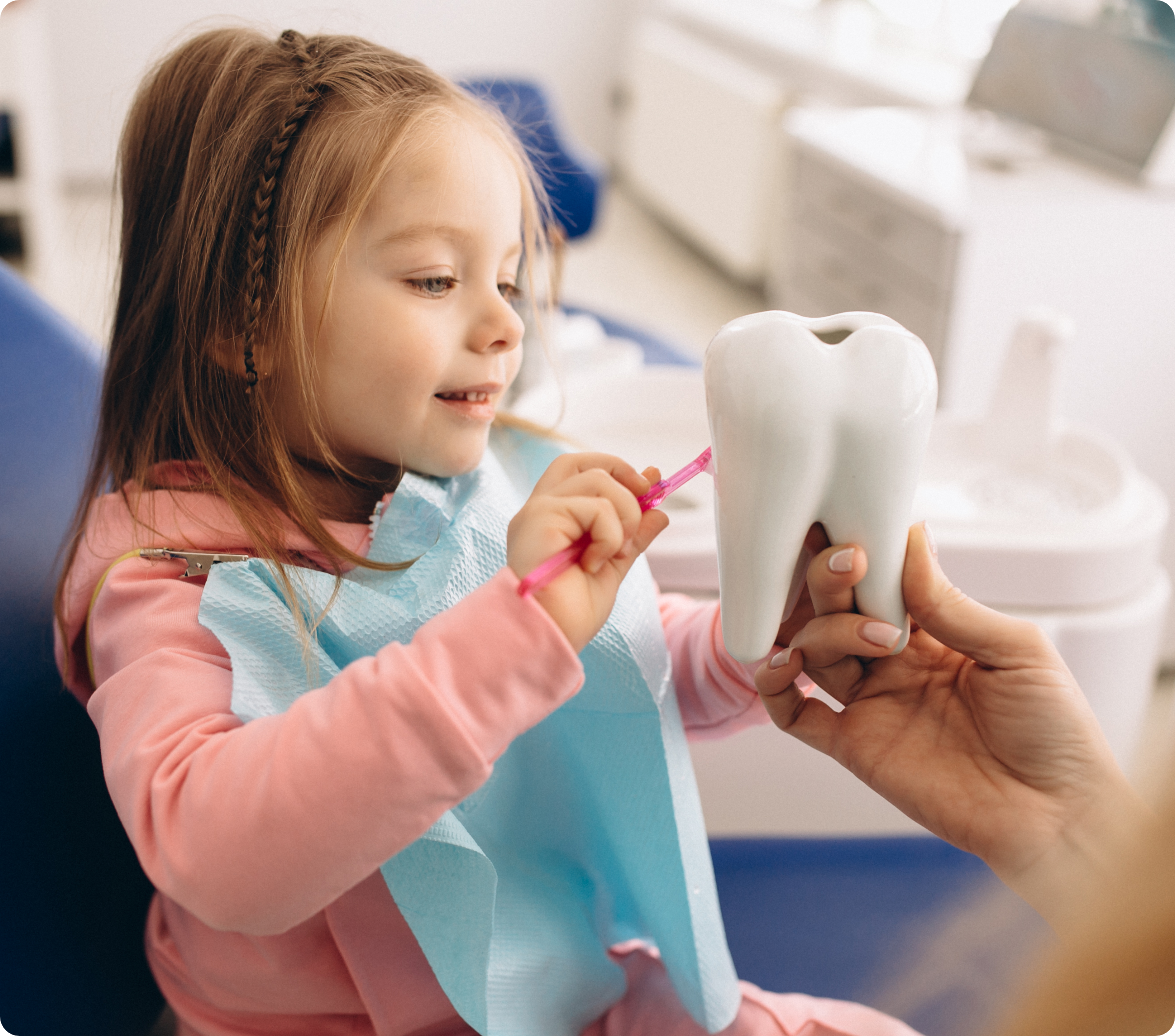- Must mention this coupon.
Pediatric Dentistry
At the office of Family Dental Center, the health and development of your child's smile are our top priorities.
Our goals are to help children establish a strong foundation for a lifetime of good oral health and experience the benefits of healthy, beautiful smiles.
Excellent Oral Health Begins With Good Oral Care
When it comes to your child's oral health, trust the experts at the Family Dental Center in Frankfort. All parents want what's best for their families. When good oral care, including routine dental checkups, start at an early age, our office can closely monitor the development and health of your child's smile as they grow. It's essential to keep in mind that preventive care and timely treatment for any emerging dental issues not only helps to ensure ongoing oral health but also supports overall well-being, and contributes to a positive self-image.
You can rest assured that your child's smile is in the best of hands at our office! We provide gentle and precise care in an environment that's comfortable, warm, and engaging. At the office of Family Dental Center Frankfort, we offer a comprehensive range of dental services designed to address the dental needs of children of all ages. Whether it's your little one's first trip to the dentist, a routine visit, treatment for a dental emergency, or more, we're well equipped to provide the care that's needed.
We take a proactive approach and emphasize the importance of dental prevention as the key to good oral health. We provide you and your child with the resources as well as the tools to establish an effective brushing and flossing routine and offer nutritional guidance and advice on potentially harmful oral habits. Our entire team strives to make each visit with your child a positive, informative, and beneficial experience.
Pediatric vs General Dentistry: Know the Difference!
Fill Out The Form Below to Download Your Guide to Pediatric Dentistry

The Guide Will Show You
Dental Implant Options
Average Pricing
Factors That Affect Eligibility
And More
The Importance Of Regular Checkups And Routine Care
Studies show that children and teens lose an estimated 51 million school hours each year to dental problems. To help your child maintain optimal oral health and a smile that's healthy and bright, we recommend dental checkups and cleanings twice a year.
As skilled and compassionate providers of care, we understand all aspects of dental development and are sensitive to the unique needs of children. At each periodic exam, a member of our professional team will review your child's medical and dental history and then perform a thorough clinical assessment of the teeth, gums, jaws, and the surrounding oral tissues. We'll also check your child's bite, jaw alignment, and function.
Because it's vital to see what's going on below the surface, we'll take digital radiographs as needed, to check for the presence of any cavities, or infection and to evaluate the position of your child's developing teeth and the health of jaw bone. We'll also perform a professional dental cleaning to eliminate any plaque or debris that has accumulated between the teeth or in hard to reach places.

Tooth Decay Is The Single Most Common Chronic Childhood Disease
At every stage of your child's development, we'll advise you on the most effective methods of keeping his or her teeth clean and discuss the foods, beverages, and harmful oral habits that can lead to problems. While it can be difficult sometimes to get children into a regular oral hygiene routine, we'll give you tips and advice on how to make brushing and flossing a fun part of their daily activities. As your trusted partner you can rely on the office of Family Dental Center to keep a close watch on your child's oral health and development.
By following these simple guidelines, you can help your child maintain optimal oral health and develop a positive attitude towards dental care:
Establishing a dental partnership when your child is small
Keeping your baby's and toddler's teeth clean
Not allowing your baby to sleep with a bottle of milk or juice.
Bringing your child to the dentist for routine checkups and care
Leading by example and encouraging the recommended tooth brushing and flossing routine
Promoting wise dietary choices and healthy snacking, including replacing sugary drinks with water and limiting sweets
Providing supportive guidance to help your child put away their pacifier and stop thumb or finger sucking at the appropriate time
Making sure your child wears a mouthguard when playing specific sports
Your Baby's Smile
Even before your child is born, your little one's first set of teeth is already forming. As a matter of fact, by the time your baby is a year old, some of the front teeth will have already emerged into place. For this reason, it's essential to establish an oral care routine at an early age. As per the recommendations of the American Dental Association and the American Academy of Pediatric Dentistry, parents are encouraged to have their baby see the dentist around the time of their first birthday.

Do you want to keep your
kid's smile perfect?
Don't wait any longer to give your kid the gift of a perfect smile. Take the first step in ensuring your kid's dental health by scheduling a consultation with us today. Our experienced team of pediatric dentists will work with you to create a personalized treatment plan to keep your kid's smile shining bright.
Childhood is a time of incredible physical and emotional changes. As kids go through several stages of development, so do their teeth. Many things, including both genetic and environmental factors, contribute to the health and appearance of your child's smile. While some issues cannot be prevented, there's still a lot you can do to help ensure your child experiences optimal oral health and develops an attractive, functional smile. Our office will make sure your children are instructed in the best methods for caring for their teeth and will provide them with useful, age-appropriate information on following a healthy diet as well as make them aware of which oral habits and activities may be harmful to their teeth and overall well being.
In addition to checking for the presence of dental disease, we also monitor your child's facial growth, jaw development, and alignment of their smile. If orthodontic treatment is indicated, we'll advise you of our recommendations for care. Since many children and teens wear braces, paying extra attention to what they eat and how they maintain their oral hygiene is of the utmost importance.
Beyond good oral hygiene and routine dental care, a balanced, nutritious diet is essential for a healthy smile in a growing child. Sticky, sugary foods and drinks are not only harmful to children's oral health but also detrimental to their overall well-being. A diet rich in nutrients is critical for optimal growth and development and keeping the teeth and gums strong.
FAQs On The Topic Of Your Baby's Smile
When will my baby's first tooth appear?
A baby's first teeth begin to appear in the 6 to 12-month range. Typically, it's the two lower front ones that appear first. The baby teeth come into place from the front of the mouth and then on to the back. With that said, most children will get all of their baby teeth by the time they are three.
How should I clean my baby's new teeth?
For babies with new teeth just emerging, we may recommend just a washcloth or infant toothbrush to start. As your baby grows and more teeth come into place, an age-appropriate soft bristled brush, and a tiny dab of toothpaste will be recommended. One word of caution; be careful that your child does not swallow the dab of toothpaste. When your child gets older, we will teach him or her more about the responsibilities of self-care and oral hygiene.
What should I do if my baby is teething?
While getting teeth is an important milestone in a baby's development, it's essential to be aware that teething can make a baby quite irritable. Your little one may act fussy, have trouble sleeping, avoid eating, and drool quite a bit. While you are powerless to speed up the process of teething, there are a few things that you can do to soothe your baby as their new teeth are erupting into place. Common approaches to helping your baby feel more comfortable while getting their new teeth include safe teething rings, a cold spoon, or a moist gauze rubbed over their gums. Remember, you can always call our office if you have any concerns.
Why are baby teeth so important?
The first set of teeth not only makes it possible for your baby to smile, eat, and speak, but they also play the critical role of serving as placeholders for the permanent teeth. Losing a baby tooth too early can potentially result in a misaligned smile.
Can babies develop tooth decay?
When caring for your child's smile, it's important to remember that baby teeth are just as susceptible as the permanent teeth to decay. In fact, more than 50% of children develop cavities before the age of five. Not only does tooth decay pose a risk to the health of the involved baby teeth, but untreated cavities can also have consequences for your child's overall well-being and the permanent teeth that are yet to come into place.
What is baby bottle syndrome?
Baby bottle syndrome, which is also known as nursing bottle syndrome, refers to the rampant tooth decay that results from babies sleeping with a bottle containing milk or juice. While the damage is most prevalent in the front teeth of the upper jaw, extensive dental work is typically required to restore the toddler's oral health and prevent infections. New parents are advised not to let their baby sleep with a bottle or at least swap the juice or milk for water.
Will thumb or finger sucking affect the development of my child's smile?
Some children persist in sucking their thumbs or fingers beyond their preschool years. For these children, the activity continues to be a source of comfort, relaxation, and security. It may even help them fall asleep at night. However, it's essential to be aware that in the long-term, a finger sucking habit is not healthy.
If your child is still thumb or finger sucking by the age of five or six years, it's time to constructively help them stop the habit. If it has caused any alterations to the alignment of the teeth or jaws, or if it is affecting your child's speech or swallowing patterns, it's likely your child requires orthodontic care.
FAQs As Your Child Grows
How often should my child have a dental checkup?
A baby's first teeth begin to appear in the 6 to 12-month range. Typically, it's the two lower front ones that appear first. The baby teeth come into place from the front of the mouth and then on to the back. With that said, most children will get all of their baby teeth by the time they are three.
What if my child is anxious and has difficulty sitting for treatment?
For babies with new teeth just emerging, we may recommend just a washcloth or infant toothbrush to start. As your baby grows and more teeth come into place, an age-appropriate soft bristled brush, and a tiny dab of toothpaste will be recommended. One word of caution; be careful that your child does not swallow the dab of toothpaste. When your child gets older, we will teach him or her more about the responsibilities of self-care and oral hygiene.
Why are back-to-school checkups so important?
While getting teeth is an important milestone in a baby's development, it's essential to be aware that teething can make a baby quite irritable. Your little one may act fussy, have trouble sleeping, avoid eating, and drool quite a bit. While you are powerless to speed up the process of teething, there are a few things that you can do to soothe your baby as their new teeth are erupting into place. Common approaches to helping your baby feel more comfortable while getting their new teeth include safe teething rings, a cold spoon, or a moist gauze rubbed over their gums. Remember, you can always call our office if you have any concerns.
What causes cavities?
The first set of teeth not only makes it possible for your baby to smile, eat, and speak, but they also play the critical role of serving as placeholders for the permanent teeth. Losing a baby tooth too early can potentially result in a misaligned smile.
What is a space maintainer?
When caring for your child's smile, it's important to remember that baby teeth are just as susceptible as the permanent teeth to decay. In fact, more than 50% of children develop cavities before the age of five. Not only does tooth decay pose a risk to the health of the involved baby teeth, but untreated cavities can also have consequences for your child's overall well-being and the permanent teeth that are yet to come into place.
When is the best time to begin orthodontic care?
Baby bottle syndrome, which is also known as nursing bottle syndrome, refers to the rampant tooth decay that results from babies sleeping with a bottle containing milk or juice. While the damage is most prevalent in the front teeth of the upper jaw, extensive dental work is typically required to restore the toddler's oral health and prevent infections. New parents are advised not to let their baby sleep with a bottle or at least swap the juice or milk for water.
What's the best way to protect a child's smile if they play sports?
Some children persist in sucking their thumbs or fingers beyond their preschool years. For these children, the activity continues to be a source of comfort, relaxation, and security. It may even help them fall asleep at night. However, it's essential to be aware that in the long-term, a finger sucking habit is not healthy.
If your child is still thumb or finger sucking by the age of five or six years, it's time to constructively help them stop the habit. If it has caused any alterations to the alignment of the teeth or jaws, or if it is affecting your child's speech or swallowing patterns, it's likely your child requires orthodontic care.
Why are dental sealants recommended?
Some children persist in sucking their thumbs or fingers beyond their preschool years. For these children, the activity continues to be a source of comfort, relaxation, and security. It may even help them fall asleep at night. However, it's essential to be aware that in the long-term, a finger sucking habit is not healthy.
If your child is still thumb or finger sucking by the age of five or six years, it's time to constructively help them stop the habit. If it has caused any alterations to the alignment of the teeth or jaws, or if it is affecting your child's speech or swallowing patterns, it's likely your child requires orthodontic care.
Will my child's wisdom teeth require extraction?
Some children persist in sucking their thumbs or fingers beyond their preschool years. For these children, the activity continues to be a source of comfort, relaxation, and security. It may even help them fall asleep at night. However, it's essential to be aware that in the long-term, a finger sucking habit is not healthy.
If your child is still thumb or finger sucking by the age of five or six years, it's time to constructively help them stop the habit. If it has caused any alterations to the alignment of the teeth or jaws, or if it is affecting your child's speech or swallowing patterns, it's likely your child requires orthodontic care.
What if my child has a dental emergency?
Some children persist in sucking their thumbs or fingers beyond their preschool years. For these children, the activity continues to be a source of comfort, relaxation, and security. It may even help them fall asleep at night. However, it's essential to be aware that in the long-term, a finger sucking habit is not healthy.
If your child is still thumb or finger sucking by the age of five or six years, it's time to constructively help them stop the habit. If it has caused any alterations to the alignment of the teeth or jaws, or if it is affecting your child's speech or swallowing patterns, it's likely your child requires orthodontic care.
Why choose the office of Family Dental Center
Some children persist in sucking their thumbs or fingers beyond their preschool years. For these children, the activity continues to be a source of comfort, relaxation, and security. It may even help them fall asleep at night. However, it's essential to be aware that in the long-term, a finger sucking habit is not healthy.
If your child is still thumb or finger sucking by the age of five or six years, it's time to constructively help them stop the habit. If it has caused any alterations to the alignment of the teeth or jaws, or if it is affecting your child's speech or swallowing patterns, it's likely your child requires orthodontic care.
Any questions about your
kid's smile journey?
Meet our doctors
In our dental practice, we have an experienced, talented, and caring staff committed to
assisting you and your family enjoy a relaxing and stress-free visit for all of your dental needs.

Dr. Patrick Peters
Dr. Patrick Peters is a Northern Kentucky native but treats Anderson County as his second home. Dr. Peters has a wonderful wife, Leslie, and four great boys. A graduate of the University of Louisville in 2000. Dr Peters has been practicing dentistry for over 20 years and is committed to serving his patients. His interests in dentistry include sedation dentistry, implant dentistry, TMJ issues, oral surgery and Dental Exocad CAD/CAM Technology.

Dr. Jason Chen
Dr. Patrick Peters is a Northern Kentucky native but treats Anderson County as his second home. Dr. Peters has a wonderful wife, Leslie, and four great boys. A graduate of the University of Louisville in 2000. Dr Peters has been practicing dentistry for over 20 years and is committed to serving his patients. His interests in dentistry include sedation dentistry, implant dentistry, TMJ issues, oral surgery and Dental Exocad CAD/CAM Technology.

Dr. Chassity Betzing
Dr. Chassity Betzing has called central Kentucky home for the last 19 years. Originally from Northern California, she moved following the military after her grandmother's recommendation. She has deep roots from Eastern Kentucky, where her grandmother is from. Dr. Betzing completed her undergraduate degree at the University of Kentucky with a degree in Biology. She continued with her DMD degree from the University of Kentucky. Dr. Betzing's interests/experience in dentistry include Pinhole Surgical Technique, Implantology, sedation dentistry, and she has a passion for cosmetic dentistry and facial esthetics.

Dr. Nancy Shackleton
Dr. Nancy Shackleton has been the Orthodontist at Family Dental Center for 21 years. Dr. Shackleton became an orthodontist largely because of treatment she received as an adolescent. “I loved the environment I was treated in, with happy energetic people creating a beautiful smile for me, and that is exactly what we try to give our patients today!!”
Our patients love us
Latest Reviews
Family Dental Associates
Frankfort
Our office is located at 1006 Leawood Dr Suite 200, Frankfort, K 40601 with easy parking available in our lot and access to nearby public buses.
Phone
(502) 223-0211
Office Hours
Monday - Friday 8:00am - 5:00pm
Address
1006 Leawood Dr Suite 200, Frankfort, KY 40601
Don't wait any longer to receive the highest quality dental care in Frankfort.
If you are looking for a highly trained and experienced dentist in Frankfort, you hav come to the right place. At our practice, you will receive the highest quality dental
care. Our dental office uses the latest state-of-the-art equipment and cutting edge technology and we uphold the strictest sterilization techniques.
our patients love us
Latest Reviews
Family Dental Associates Frankfort Location
Our office is located at 1006 Leawood Dr Suite 200, Frankfort, KY 40601 with easy parking available in our lot and access to nearby public buses.
Phone
+1 (502) 223-0211
Office Hours
Monday - Friday 8:00am - 5:00pm
Address
1006 Leawood Dr Suite 200, Frankfort, KY 40601
Don't wait any longer to receive
the highest quality dental care
in Frankfort
If you are looking for a highly trained and experienced dentist in Frankfort, you have come to the right place. At our practice, you will receive the highest quality dental care. Our dental office uses the latest state-of-the-art equipment and cutting edge technology and we uphold the strictest sterilization techniques.
© 2025 Family Dental Associates. All rights reserved.
Designed by Dental Implant Machine
NOW OFFERING
New Patient Specials!
We want your visits to be efficient and gentle.
All Smiles Dental is dedicated to being your dentist in Long Beach.
Crowns, Veneers and Bridges Special
Adult’s Complete Checkup
- Includes X-ray, exam and oral cancer screening.
Emergency Exam
- Must present this coupon.
© 2022 Madison Smiles. All rights reserved.
